10 - Contracts
Published online by Cambridge University Press: 05 June 2012
Summary
Approaching the Issue
Governments generally pursue large-scale infrastructure and energy projects through public-private-partnership contractual techniques. Projects go by a range of names, including project finance, limited recourse financing, public-private partnerships, and P3s. Regardless of the chosen name, these infrastructures all involve shared control by a transnational set of actors over the project life cycle from planning to financing, tendering to construction, and operation to maintenance. This mode of pursuing projects gained in popularity during the 1980s and 1990s internationally.
In developing countries, P3s resulted from a range of endogenous and exogenous factors. Fully industrialized countries and infrastructure banks advocated the introduction of P3s into infrastructure sectors through technical assistance, tied aid, and loans and insurance policies. Host governments were often receptive because they faced substantial infrastructure needs and possessed limited financial liquidity. Many countries had large budget deficits that made tax-payer or sovereign loan–financed infrastructures not practicable. Here, project finance provided access to international pools of capital through off-balance-sheet financing, which made projects possible. Through project financing, lenders relied on revenue generated from user charges of projects rather than on government payments.
- Type
- Chapter
- Information
- Obama's BankFinancing a Durable New Deal, pp. 187 - 250Publisher: Cambridge University PressPrint publication year: 2010



